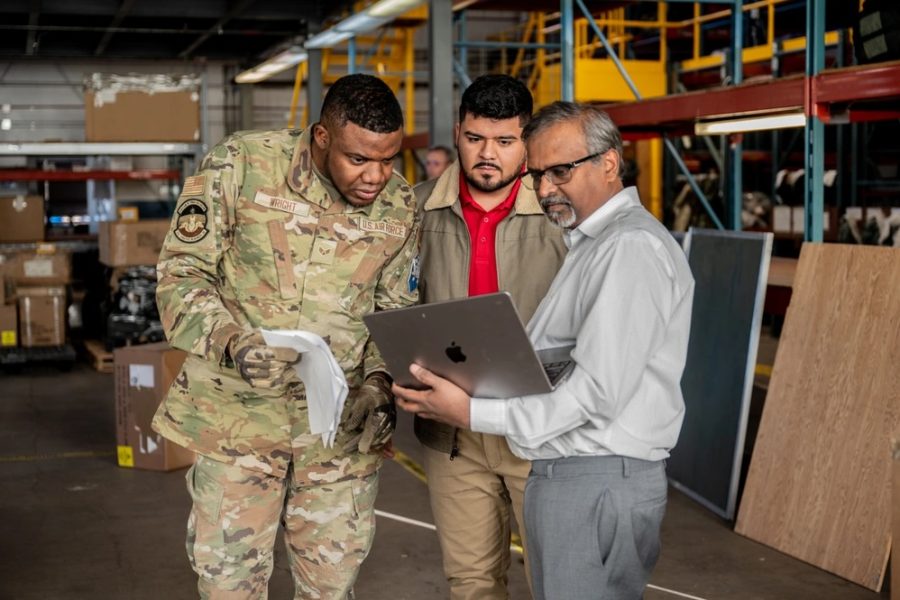The personnel chiefs for the Air Force and Space Force told lawmakers that plans to lay off thousands of civilian employees could present challenges to recruitment efforts and perhaps even operations, particularly for the Space Force.
“I will tell you, because we rely heavily upon the Air Force for support, and that the preponderance of our Guardians, military and civilian, are operationally-focused, this is going to be a challenge for us,” Katharine Kelley, deputy chief of space operations for human capital, told the House Armed Services personnel subcommittee in a hearing April 30.
Kelley’s comments came about two months after Defense Secretary Pete Hegseth announced a plan to reduce the Defense Department’s civilian workforce by 5 to 8 percent, part of a greater effort by President Donald Trump to reform the federal workforce. Rep. Chrissy Houlahan (D-Penn.), an Air Force veteran and ranking member of the subcommittee, said she worried such reductions mean that “we’re necessarily asking more of those who are in uniform or are left behind.”
Lt. Gen. Caroline Miller, Air Force deputy chief of staff for manpower, personnel, and services, said she expects to lose about 12,000 Air Force civilians, roughly six percent of the department’s 186,000 civilian employees. Meanwhile, Kelley estimated that civilians make up about a third of the Space Force’s 17,000 members. She expects to lose about 10 percent of those civilians, which translates to about 570 people.
“The impact of losing civilians is exponentially hard on the Space Force because of the outsized impact of the total population,” she said. “We have to look very carefully about how to mitigate that 10 percent and how to be very, very intentional about making sure that that does not have a direct mission impact.”
Kelley’s concerns echoed those shared by top Space Force officials at the AFA Warfare Symposium in March. Lt. Gen. Philip Garrant, the head of Space Systems Command, said at the time that a “considerable number” of civilian employees at SSC had taken the deferred resignation program (DRP) offered by the new administration.
It’s too soon to tell how the reductions will break down by pay grade or job specialty, an Air Force spokesperson told Air & Space Forces Magazine. Batches of workers have requested DRP and voluntary early retirement options, but the Air Force is still working out how many of those might fall under policy exemptions.
Until then, the Air Force “expects near-term civilian employee reductions to affect all mission areas to some degree, while limiting reductions that directly support warfighter readiness and lethality,” the spokesperson said.
Probationary employees, meaning workers hired within a year or so ago and thus with fewer protections than their longer-serving colleagues, “will make up only a very small portion of the overall reductions,” the spokesperson added.
Meanwhile, the Space Force reductions “have been proportionately distributed across the workforce based on both skill and tenure of civilian Guardians.”
Miller said she hopes all the resignations will be voluntary rather than mandatory through a reduction-in-force pathway, but she did say the reductions could chill recruiting, as candidates may feel “uncertainty about … whether or not you’ll be able to maintain that position.”
“As we continue down this road for the next several years, we just have to watch the second and third order impacts of ‘how is that going to impact recruiting?’” she said.
Miller’s fellow service personnel chiefs also expressed uncertainty about the reductions. Army Lt. Gen. Brian Eifler expects to lose about 16,000 employees, “which is significant,” but he said the Army is trying to make sure the departures do not impact the mission.
Marine Lt. Gen. Michael Borgschulte said about 1,600 civilians took the DRP offer. Navy Vice Adm. Richard Cheeseman Jr. did not have an estimate, but he spoke to the importance of Navy civilians.
“I can’t do my job without my three-star civilian equivalent deputy,” he said. “She did not take the DRP, good for me, but I am very concerned about my force development pipeline, how this will affect the schoolhouses and how it’ll affect our pay systems going forward depending on how that shakes out.”
Both the Air Force and Space Force are also complying with a military-wide civilian hiring freeze for all but mission-essential roles. The freeze has proven dirsuptive even for areas where exemptions were granted, such as child care, because delays have an outsized impact in areas where hiring was precarious even before the temporary pause took effect.
At the hearing, Miller said several civilians who trained child care providers took the first round of DRP, which, alongside other changes, has forced the Air Force to shift some of its workers and resources. That means the service may have to reduce the hours for some of its programs during the summer, a popular time for youth and child care activities.

